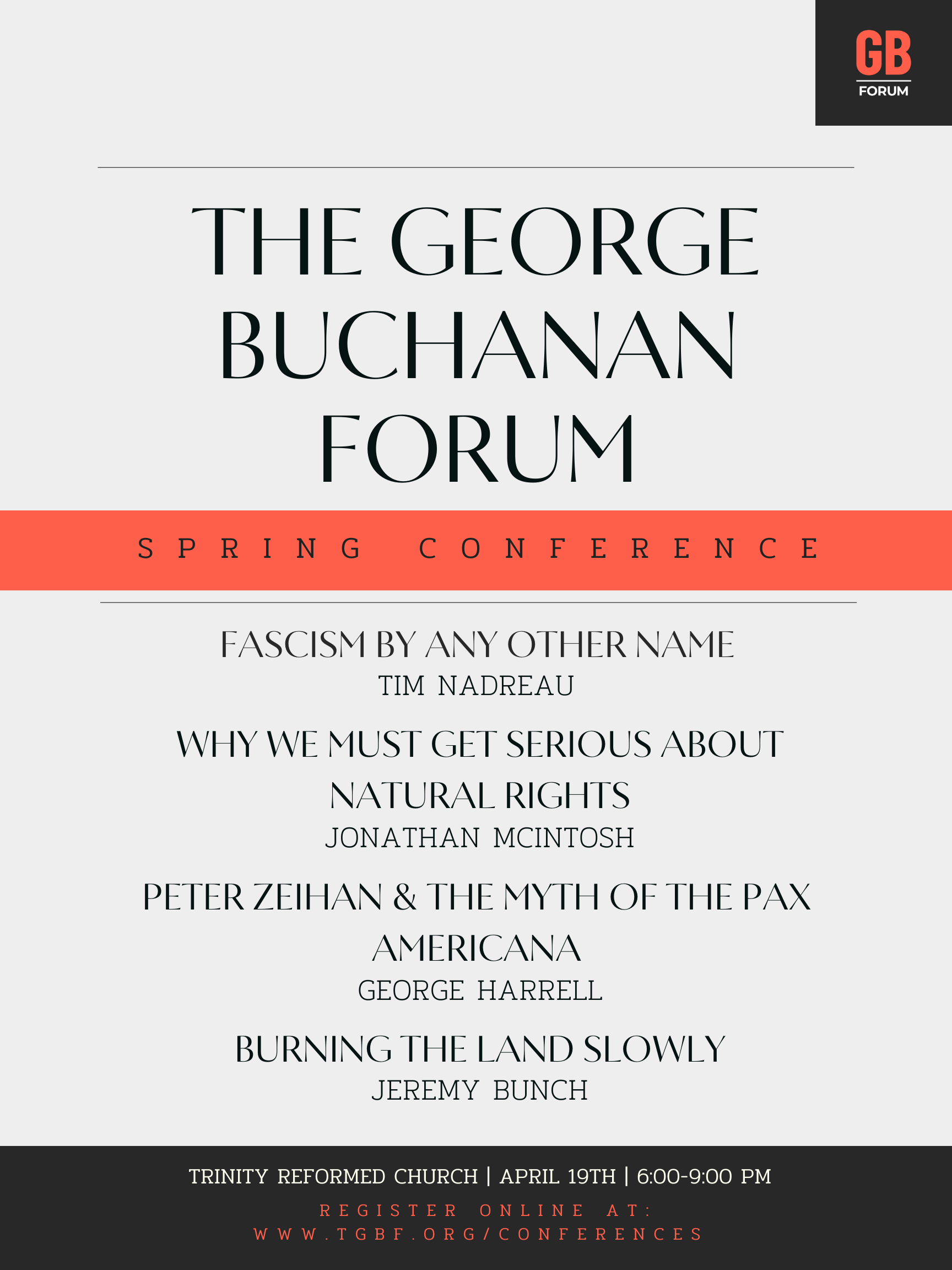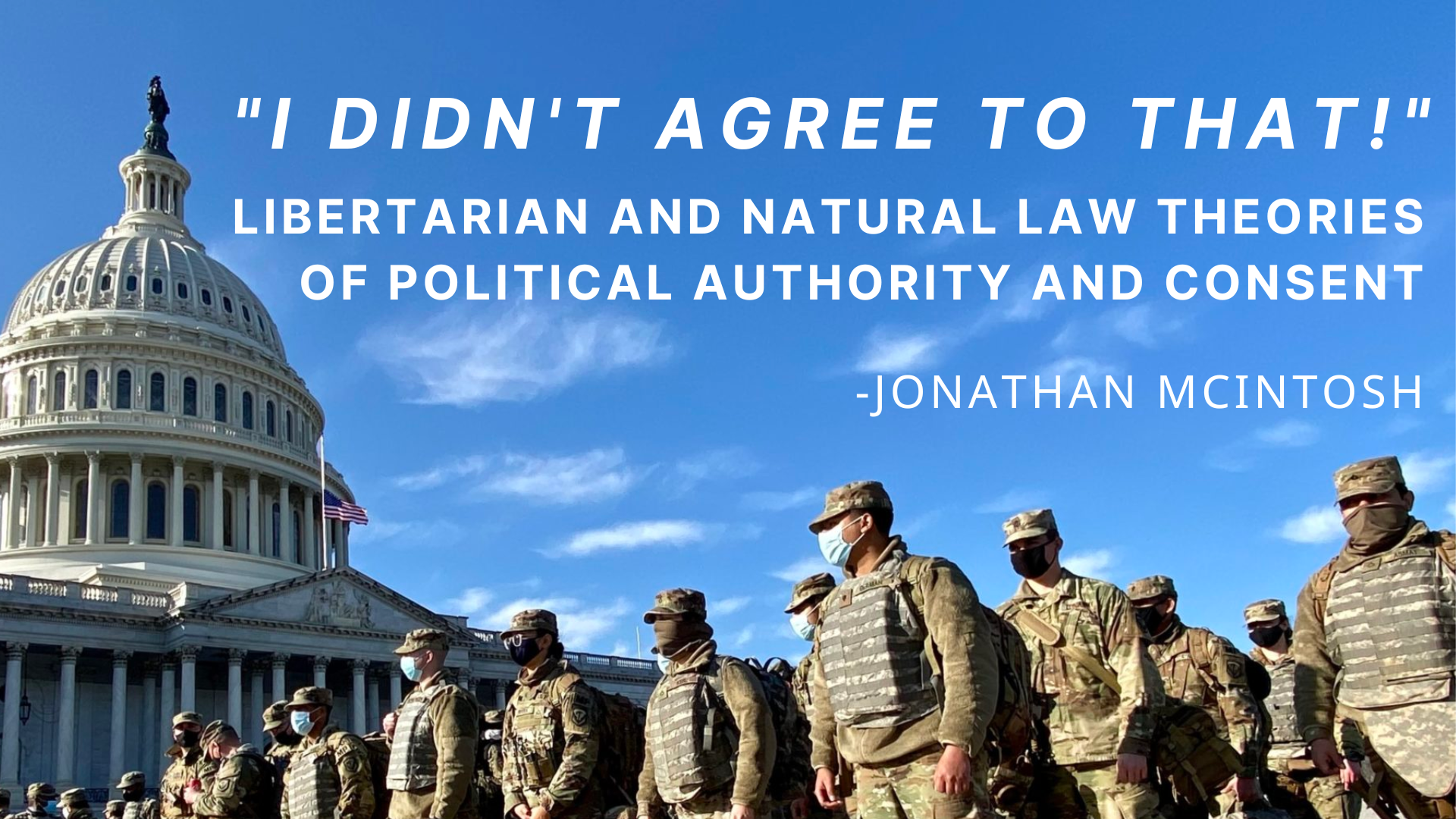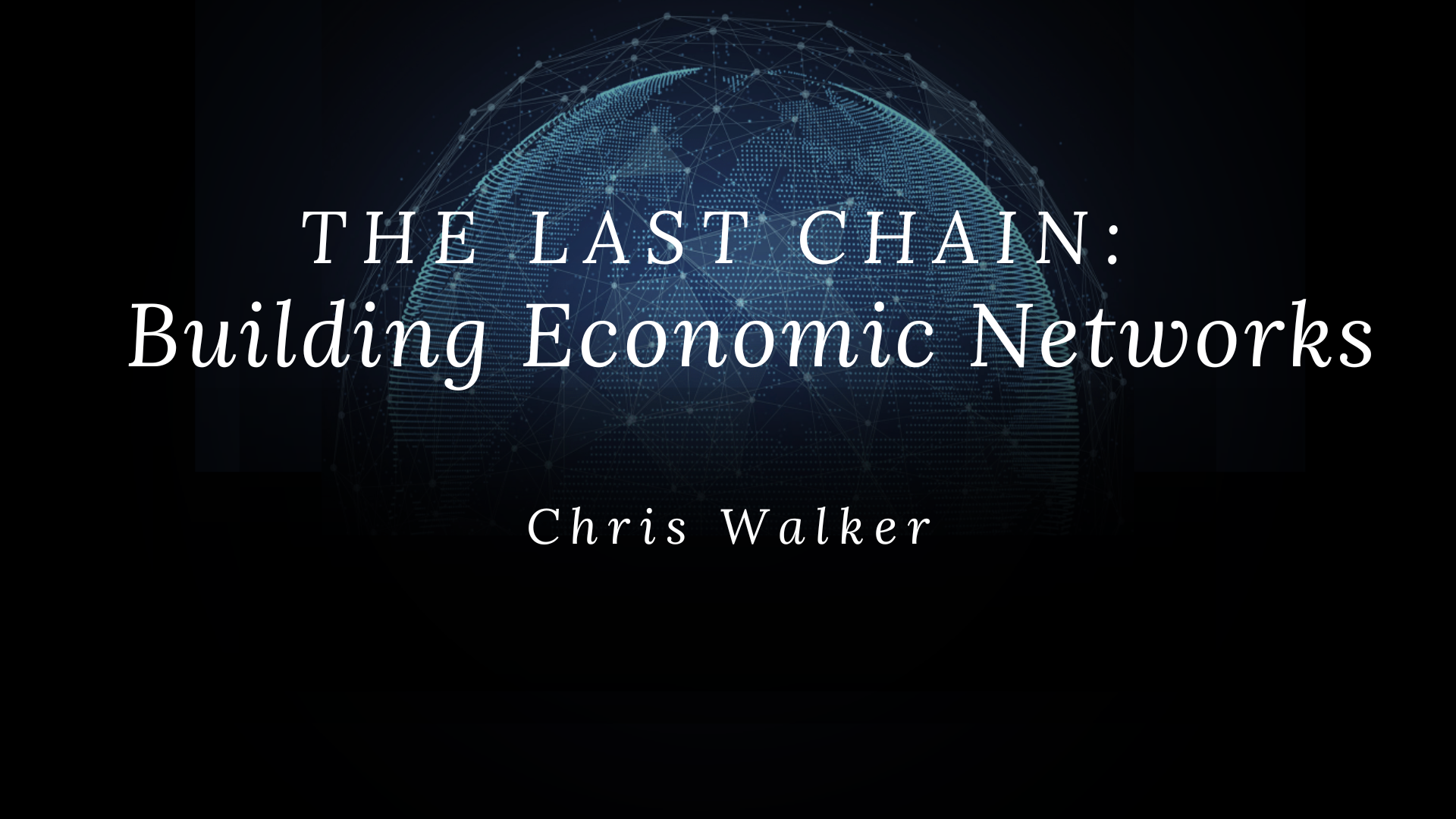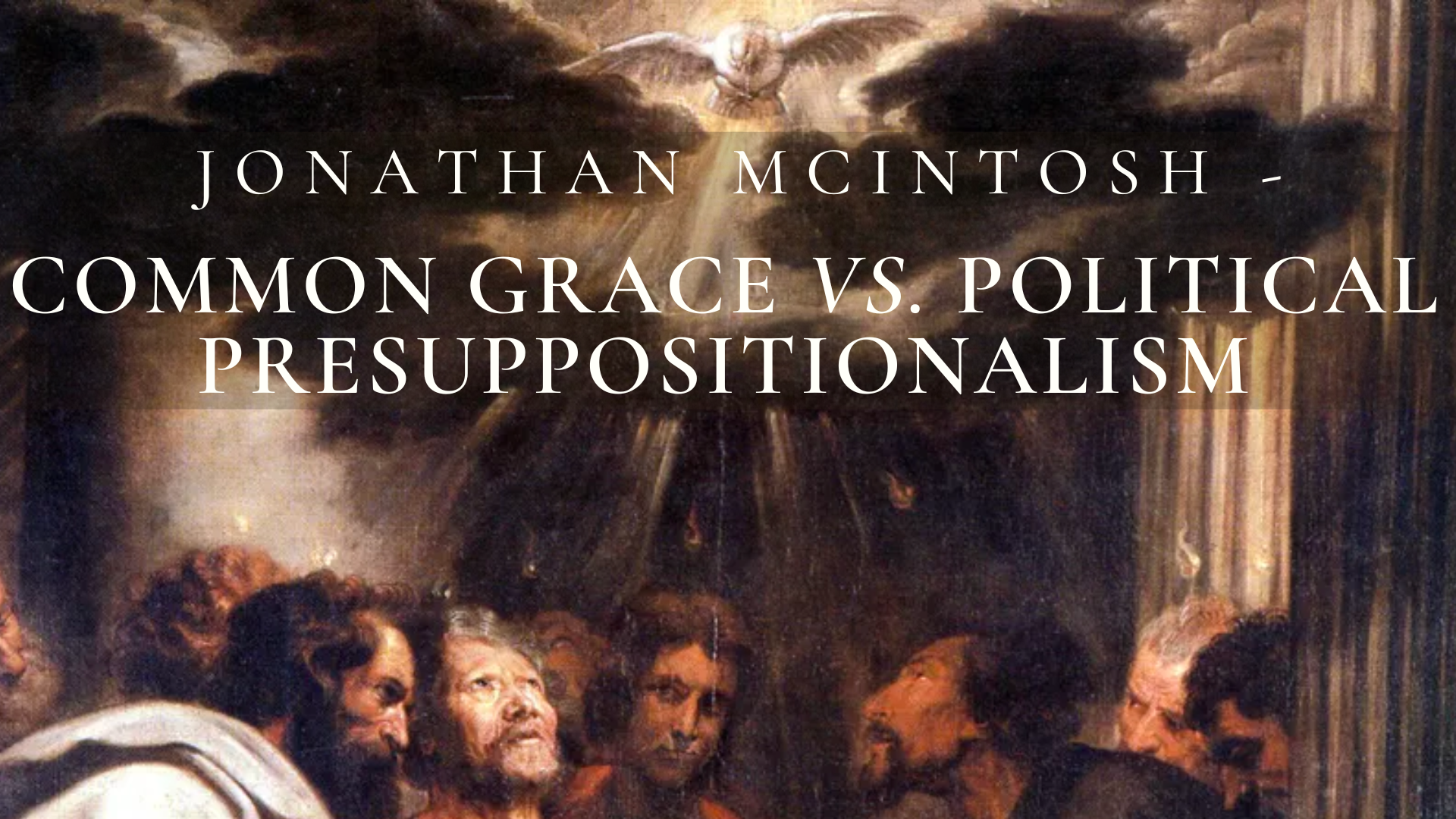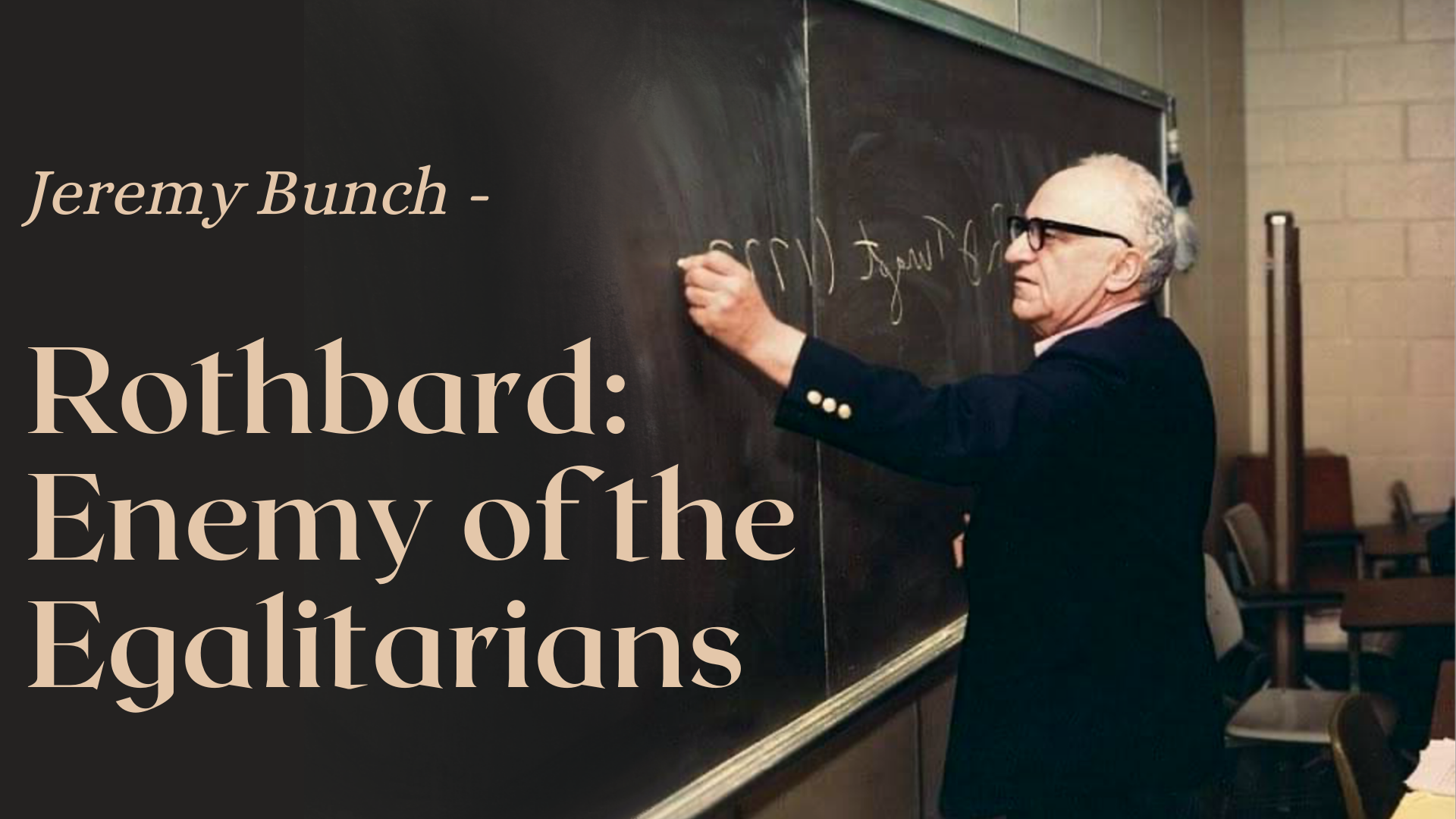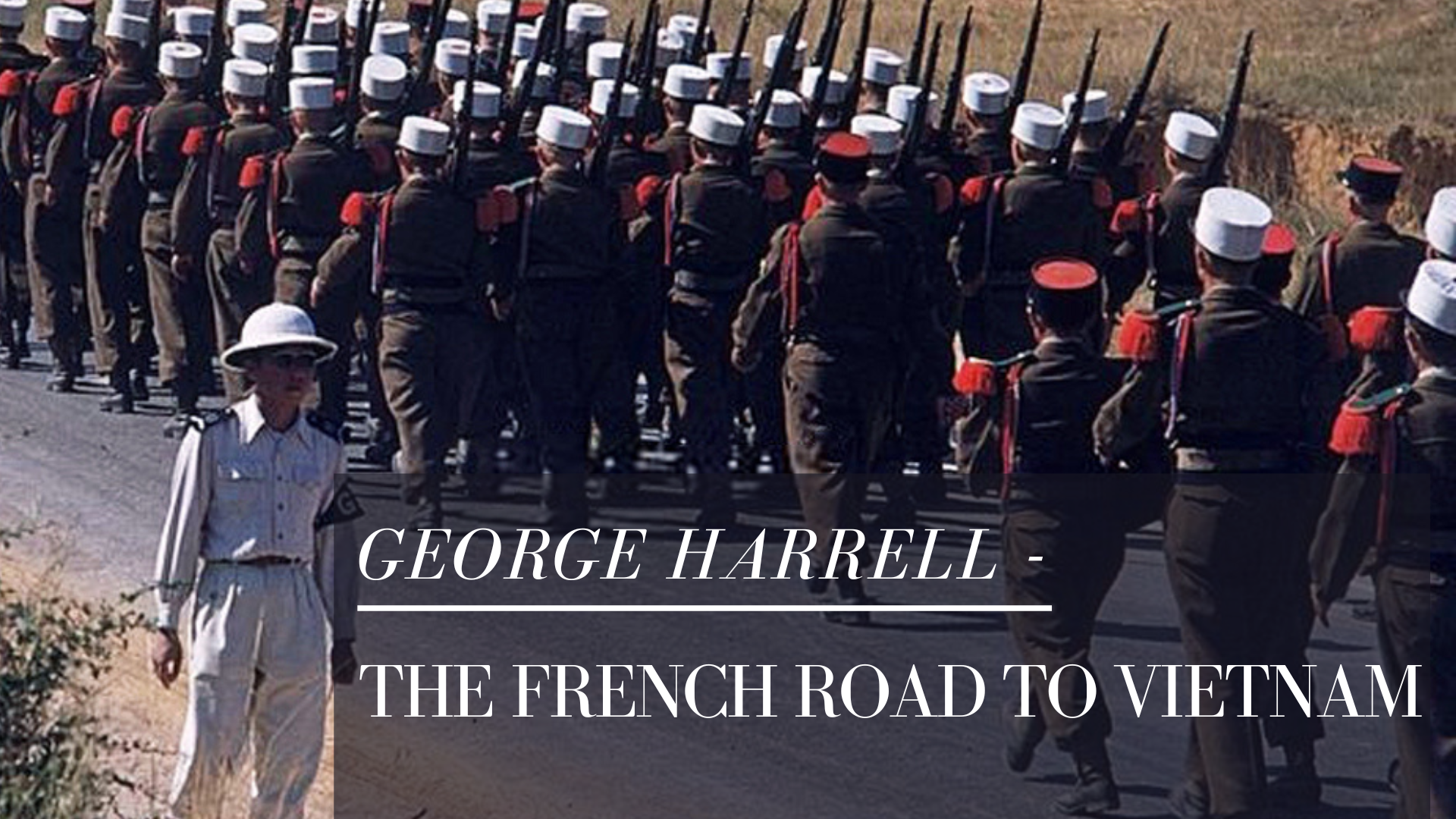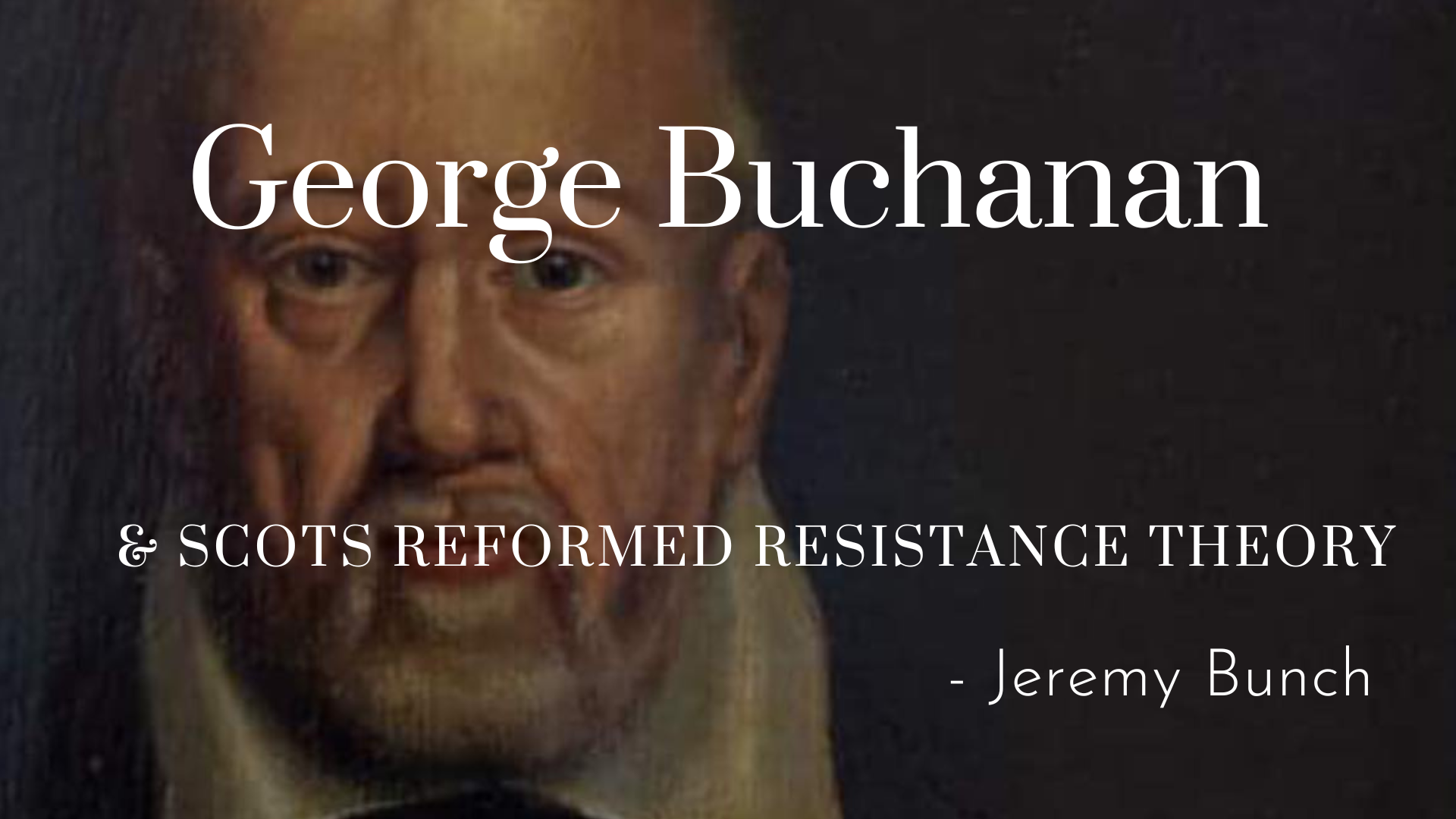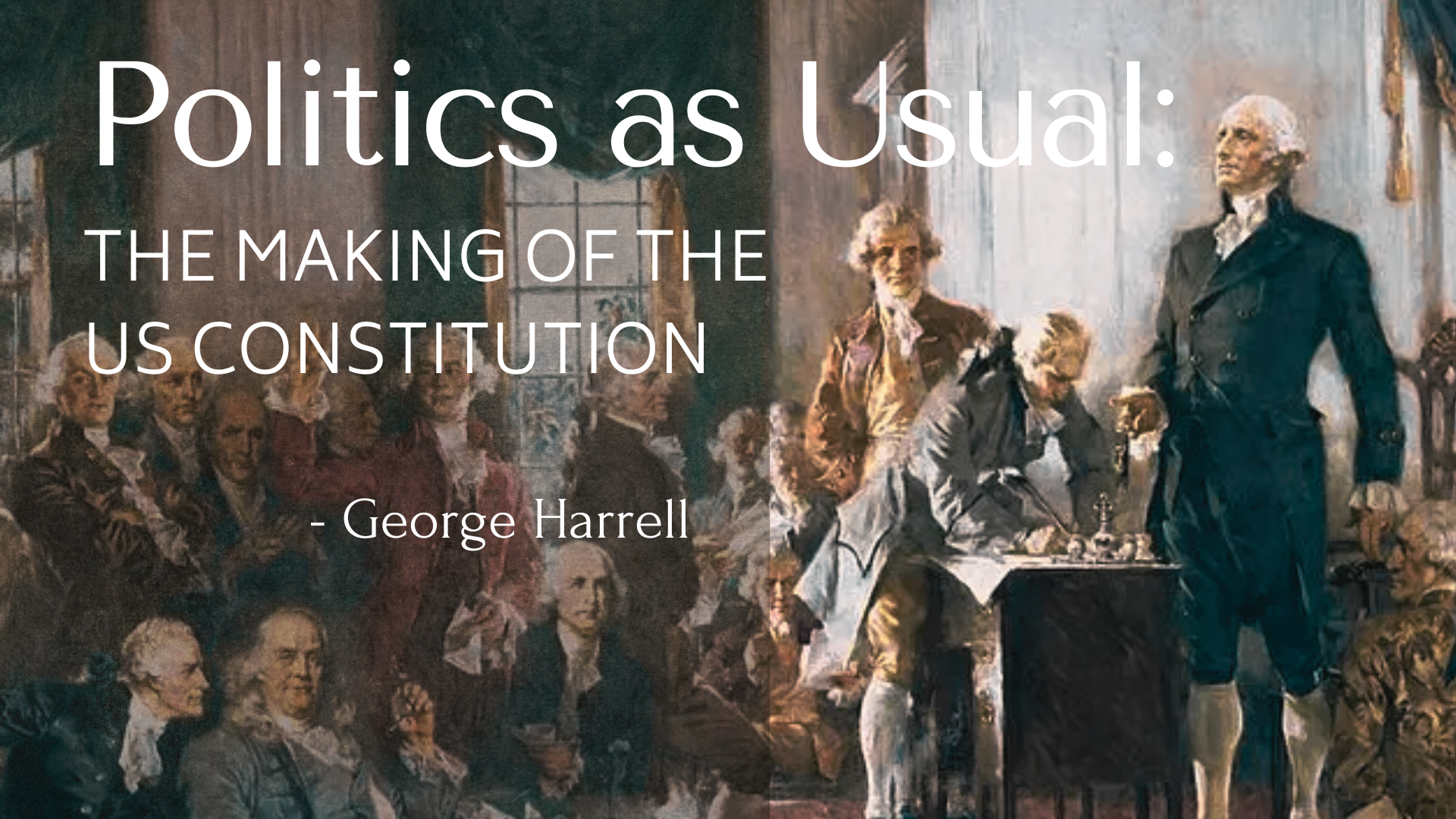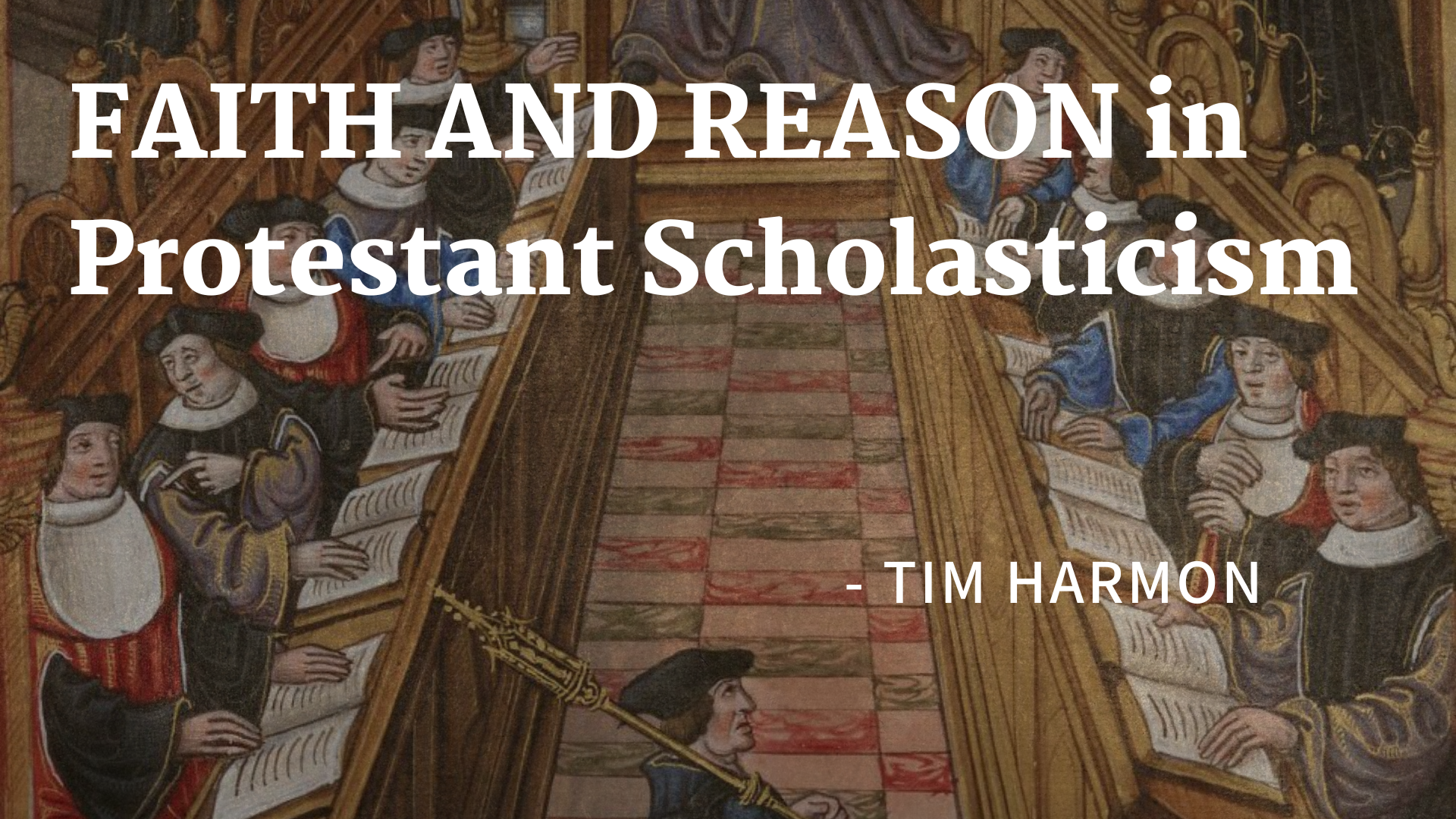
George Buchanan was a late 16th-century Scottish Reformed polymath who argued for the restraint of civil rulers, resistance to tyranny, and the freedom of Christian citizens. Like its namesake, the George Buchanan Forum is a community of liberty-minded Christians seeking to educate and equip people with a message of liberty and the gospel through integrating theology, natural law, and history.
UPCOMING CONFERENCE:
Join us at the upcoming Spring conference on April 19th for free food and lectures! Please RSVP and let us know that you plan to attend.
PREVIOUS CONFERENCES:
SUMMER 2023
The Quibbling Rabble: The History and Future of US Housing Policy
Brian Points
Believe it or not, land use policy and its array of offshoots form one of the most hotly contested political issues in the USA today. Topics such as comprehensive plans, conditional use permits, re-zoning, and variances are keeping some of your neighbors up at night. With materials and development costs skyrocketing, state and local elected officials are desperately looking for answers that can pull some of the authority away from the rabble that dispute development at every turn.
The deep irony here is that the "local control" that Conservatives so deeply desire has led to policy resulting from a small group of citizens' narrowly defined self-interests. So, how should we change our collective thinking about land use? Should the federal government play a more active role to reinforce our fundamental rights? And, how can other lessons of economics provide us some guidance?
A Conservative Rethinking of the French Revolution, Part 2
George Harrell
The French Revolution has entered the popular imagination as a class conflict arising from Rousseau’s Enlightenment philosophy. However, if we analyze the French revolutions of 1789 and 1792 with a proper historical approach that appreciates the true nature of human action, we discover that the motivations behind these events were far more complex, and even conservative, than have been popularly portrayed. Understanding this affects how we compare and contrast the French Revolution with the American Revolution, and how we understand the broader role of ideology in social movements.
More Mere Than “Mere Christendom”
Jonathan McIntosh
For over a decade Pr. Douglas Wilson has been introducing the highly suggestive term Mere Christendom into contemporary Christian discourse as a way of describing what it is that Christians ought to be striving for politically. With the recent publication of his book by the same title, this is as opportune a time as any to ask: Just what is “Mere Christendom”? What appear to be its essential affirmations, denials, and insights? What have been some of the notable criticisms of it so far, and in what ways might these criticisms miss the mark? On the other hand, from a natural law libertarian point of view, what are some of its apparent ambiguities, tensions, and (as-yet) unanswered questions? This talk will address these questions and more.
Xenophon and Socratic Libertarianism
Jordan Dorney
Why does it seem so difficult for people to acquire, exercise, and establish political rule over others? Why can't human rulers get their human "herds" to obey them willingly like shepherds can with sheep? Why is everyone always revolting against the regime? Xenophon's Education of Cyrus begins with reflection on these questions apparently connected to the anthropological case for libertarianism.
For Xenophon, the figure of Cyrus the Great would seem to resolve them decisively in favor of absolute tyranny: Cyrus makes it look so easy to conquer nations and subjugate individuals that not only does the regime itself seem natural but the tyrannical one most of all. Man looks made to be dominated, until even the greatest of kings proves inadequate to the task. Should we look for an even greater king with an even better art of kingship, or is this proof that man is born free and for freedom?
This presentation introduces the political writings of the greatest student of Socrates not named Plato and attempts to provide a defense of natural liberty and a skeptical perspective toward attempts to subsume that liberty in or under political life.
SPRING 2023
"I didn't agree to that!" - Consent and Other Theories of Political Obligation
Jonathan McIntosh
Does government derive its legitimacy from the consent of the governed? In the modern era, the doctrine of consent has become so popular as to be commonplace, yet it is far from clear what it would actually mean for government to be truly based on consent, or how such a theory is to be reconciled with other Christian convictions on authority, custom, tradition, and submission. This presentation traces some of the notable moments in the history of consent theory from the Middle Ages to the present, seeking to clarify just what the Declaration of Independence, for example, means when it says that governments “derive their just powers from the consent of the governed.”
Frédéric Bastiat - Economic Harmonies & Discord
Jeremy Bunch
Frédéric Bastiat's (1801-1850) project of critically explaining the glories of free and voluntary markets from an economic perspective went left unfinished due to disease that took him at a relatively young age. However, many of his key thoughts are contained in his book Economic Harmonies. For Bastiat, economic harmony is naturally a result of men living according to God's design. But when men kick against this design with political power and cultural degradation, discord results.
Antidote to Anecdote - Statistics as Crucial to Tertiary Christian Education
Isaac Madsen
The COVID-19 pandemic highlighted an issue in tertiary Christian education. Many Christians are deficient in their understanding of statistics. Whereas a lack of understanding in specialized fields (e.g. soil science) results in an excusable knowledge gap, an inadequate understanding of statistics bars access to a great deal of knowledge which relies on data. Data is used to make inferences in the sciences and inform decisions in government and business. The means by which data is interpreted to usable information are statistical methods. In this way, statistics is not a string of disconnected numbers, but rather a set of techniques that when appropriately applied allows for a more accurate understanding of our world.
It is not necessary for all Christians to understand the process by which data becomes information, but for those who wish to make claims regarding the excess mortality during pandemics, the efficacy of masks, etc... an understanding of statistics is essential. For this reason Christians who seek to shape culture through leadership in business, science, and government should have a rudimentary understanding of statistical methods. Tertiary education institutions seeking to cultivate such cultural leadership should carefully consider including statistical methods as core curriculum.
A Conservative Rethinking of the French Revolution, Part 1
George Harrell
The French Revolution has entered the popular imagination as a class conflict arising from Rousseau’s Enlightenment philosophy. However, if we analyze the French revolutions of 1789 and 1792 with a proper historical approach that appreciates the true nature of human action, we discover that the motivations behind these events were far more complex, and even conservative, than have been popularly portrayed. Understanding this affects how we compare and contrast the French Revolution with the American Revolution, and how we understand the broader role of ideology in social movements.
FALL 2022
A Libertarian View of Christian Nationalism
Jeremy Bunch
Christian Nationalism has specifically come into its own in the last year as an ideological movement. One of the core driving forces of this movement is the insistence on recognizing objective truth about the world, not giving into ideologically progressive lies about the nature of creation, and therefore recognizing that dictionaries are important to any meaningful discourse in society. Libertarians find this emphasis on the natural order and on truth to be a refreshing development within American conservatism, and also welcome many of the ideals expressed by Christian Nationalism, recognizing that these ideals have long been held and promoted by libertarians. This talk will address that, despite such progress, there are Christian Nationalists who continue to misrepresent libertarianism as being improperly individualistic and lawless.
These Un-United States: National Myth and Political Reality in the American Founding
George Harrell
Calls for a resurgence of American nationalism are often defended by a supposed historical American national identity that emerged either with the Declaration of Independence in 1776 or with the adoption of the U.S. Constitution in 1789. And indeed, throughout the 1770s, 80s and 90s, American politicians often argued for separation from Britain, and American union, due to their claims of a national identity. However, the idea of American external differences and internal similarities was more of a useful political fiction than a reality. And for years after the emergence of the United States, an American national identity would elude the founding generation as they denounced one another as traitors to the Republic, attempted to form alliances with foreign enemies, and discussed secession from the government that they had helped to create.
The Last Chain: Building Economic Networks
Chris Walker
A dive into a critical analysis of monetary premia held by current currencies, and a proposal to support local human flourishing through digital currencies targeting local price stability via algorithmic central banks.
What Should We Think About The Social Contract?
Jonathan McIntosh
Social contract theory is the idea that the political community has its origins in, and that political legitimacy and obligation therefore rest upon, the consent of the governed. This lecture will revisit John Locke’s famous version of the social contract, while also touching briefly on both its antecedents in earlier political philosophy and its later influence on the American founding. The lecture will conclude with some questions that the Lockean social contract theory ought to have Christians everywhere asking today.
SPRING 2022
Common Grace vs. Political Presuppositionalism
Jonathan McIntosh
The doctrine of common grace is important for helping us avoid two opposing ditches that Reformed Christians are prone to fall into in thinking about the possibility of a shared social order between believers and non-believers. Related to avoiding these two ditches, the doctrine of common grace also helps us unite two impulses that are often assumed to be antithetical to each other.
How to Create a Coup - How the 1953 Overthrow of Iran Became a CIA Blueprint
George Harrell
In 1953 the CIA secretly paid for and organized a coup against Iranian Prime Minister, Mossadegh, overthrowing Iran’s parliamentary government and replacing it with the dictatorial regime of the Shah. This event, the CIA’s first coup, became a turning point in CIA history. The ease with which they were able to conduct regime change, and its apparent resounding success, encouraged the CIA to attempt to replicate their Iranian coup numerous times around the world. Thus knowing the history of the 1953 coup can help provide a context for so much of the modern history of Iran, the Middle East, the Cold War, and even 21st century geopolitics.
Rothbard - Enemy of the Egalitarians
Jeremy Bunch
Murray N. Rothbard critiqued egalitarianism for its unreasonableness and its truly horrific agenda. Egalitarianism, according to Rothbard, is a revolt against the order of nature, and such revolts must be exposed for their evil intents. Socialism, a political and economic revolt against nature, carries the egalitarianism agenda, and therefore its tenants and implementation must be strongly repudiated. Rothbard’s critiques from the 1970’s provide ammunition against the horrors of egalitarianism and socialism in our days, where we find ourselves some 50 years downstream of not listening to his warnings.
The Economic Impact of ‘Greater Idaho’ to Idaho, Oregon, and Everywhere In Between
Brian Points
Points Consulting (PC) worked with the Claremont Institute (CA) on a study of the economic impacts of changing the state borders of Idaho and Oregon such that the majority of southern and eastern Oregon would join the Gem State. The study assesses impacts on each states’ budget and changes to productivity and output for the 22 converting counties. Though the study is largely apolitical in nature, PC’s President, Brian Points, will also provide his commentary on the feasibility of the border change, and the positive and negative aspects of the proposal from a philosophical and cultural perspective.
Video of this talk is unavailable until the study results have been approved
FALL 2021
Pre-fall Civil Government? Why There Wasn’t, and Why It Matters
Jonathan McIntosh
Would there have been political authority had Adam and Eve never fallen? St. Augustine famously said “no,” while St. Thomas Aquinas argued “yes,” with later thinkers being somewhat divided on the issue. A common temptation, however, is to dismiss the question as a point of idle speculation. How can we know? And who cares, anyway? While dogmatic certainty on such a point is perhaps not possible, the question of pre-fall civil government can nevertheless be quite valuable, even practical, as it challenges us to think hard about and to make careful distinctions in regard to what we take the nature and purpose of civil government to be. This presentation will canvas some of the historical positions on this question, will make a case for thinking there was no pre-fall civil government, and give a sense of just what is at stake in this issue.
Ag Subsidies - the World's (Other) Oldest Profession
Timothy Nadreau
Every OECD [Organisation for Economic Co-operation and Development] nation, with the exception of New Zealand, has some form of federal agricultural policy in place. Yet most discussions on political philosophy and policy avoid discussions of the handouts given to the right wing. This talk is structured to discuss the perverse incentives at the core of the U.S. Farm Bill, what the end of the road for federal farms looks like, and to tell one of the most recent and interesting Supreme Court Rulings regarding farm policy. Reality paints a view of farmers far different than the bucolic pictures of Rockwell, and shows them to be the compliant children of paternalistic governments.
The French Road to Vietnam
George Harrell
The Vietnam War has become the symbolic hot conflict of the Cold War. While the U.S. only officially entered the fight in Vietnam after the 1964 Gulf of Tonkin Incident, it was U.S. money and U.S. military support of French imperialism as early as 1945 that made the French-Indochina War possible, which the U.S. then inherited as the Vietnam War. What started as a local fight for self-determination in the Far East against French imperialism then became rebranded as part of a war between competing ideologies for global supremacy.
Hard Hearts & Monarchs - Deuteronomy and 1 Samuel
Jeremy Bunch
The interpretations of the people of Israel asking for a king in the narrative of 1 Samuel are varied, particularly in connection with Deuteronomy chapter 17, where Moses anticipates this historic event. This talk makes observations from both Deuteronomy and 1 Samuel in order to develop a consistent interpretation of the meaning of Israel’s significant shift in political governance.
SUMMER 2021
Cyberpunks for Jesus: A Theology of and Praxeology for Christian Hacktivism
Luke Mason
This talk examines Christian hacktivism from an ethical, historical, and philosophical perspective, and establishes a birds-eye view of the current climate. It touches on issues of governance, privacy, property rights, and much more.
Theonomy, Westminster, and Libertarianism
Jonathan McIntosh
This lecture covers the definition of theonomy, the historic Reformed rejection of theonomy in favor of the principle of "general equity," and the Reformed explanation of general equity in terms of the "law of nations" (ius gentium). The lecture concludes by relating libertarianism to both the Reformed principle of general equity on the one hand and the theonomic regulative principle of the state on the other.
The Munich Myth: Reexamining the Lead-up to WWII and Appeasement
George Harrell
Chamberlain's failed policy of appeasement at Munich has become a byword for kowtowing to evil. It has also become the argument for every foreign intervention since WWII. However, the popular "lesson of Munich" narrative fails to capture the complexities of 1930s European geopolitics, as well as British and French foreign policy decisions. And the real lesson from Munich has more to do with how people reduce and repackage historical events into useful slogans for their own contemporary ends.
WINTER 2021
George Buchanan & Scots Reformed Resistance Theory
Jeremy Bunch
George Buchanan was a sixteenth century Scottish Calvinist and humanist, whose “unparalleled reputation as a Latin poet, playwright, polemicist, historian and political theorist” brought him to the middle of the complex political and ecclesiastical issues of the Scottish Reformation, as well as earning great influence on the Continent through his theories on political resistance. Buchanan provides a model for us in recognizing that the integration of history, Natural Law reasoning, and theology leads to intellectual consistency much needed in our time.
Taking from Caesar: Cryptocurrency as a Better Game of Money
Chris Walker
Cryptocurrency has pushed the boundaries of how economists have traditionally thought about the nature of money. Exploring the differences between cryptocurrency and more traditionally defined forms of money helps us understand a way forward toward a moral monetary system, one that has separated itself from state control.
Southern Slavery & Confederate Socialism
George Harrell
In the antebellum South the planter-class used fundamentally anti-free market means to build a slaveocracy, with which they exploited and oppressed not only black slaves, but also non-slave owning whites. This system of state and federal coercion eventually then evolved into full blown economic socialism with the rise of the Confederacy.
Evaluating Calvin: A Critique of On Civil Government
Jonathan McIntosh
Calvin’s “On Civil Government,” from book 4, ch. 20 of his Institutes, is a foundational text in Reformed political theory. Though Calvin situates himself within the classical natural law tradition, adapting it to a new, Protestant context, in important ways his work marks a regression from some of the more liberalizing tendencies of earlier natural law theory in favor of a new, more authoritarian emphasis.
An Integrated Theology of Biblical Kingship
Jeremy Bunch
The biblical role of the magistrate in society has long been debated in the church down to our own day, but the theological approaches to the matter have largely leaned on a systematic theological approach, where proof texts are plucked out of Scripture without recognition of an overarching biblical narrative. Without diminishing the importance of systematic theology, developing a robust biblical theology, along with applying Natural Law categories and definitions to foundational theological realities, provides a framework for a consistent and coherent political theology.
Politics as Usual: The Making of the US Constitution
George Harrell
Americans, and especially conservative Americans, hold the Constitution with a certain holy reverence, as though it was the product of the founders’ unified, political ideology for how best to run a government. In reality, the U.S. Constitution reflects not just the founders’ good intentions, but also, as Benjamin Franklin described it, “their prejudices, their passions, their errors of opinion, their local interests, and their selfish views.” It was this politically compromised and often unpopular constitution that the founders then unexpectedly foisted upon the American people.
Towards a Natural Law Libertarianism
Jonathan McIntosh
Though usually thought of as antithetical philosophical frameworks, classical natural law theory and political libertarianism belong together. Natural law theory provides libertarianism (the political theory based on the non-aggression principle) with the theological and moral framework in which libertarianism finds its proper grounding, and libertarianism is the consistent political outworking of the natural law tradition.
Faith and Reason in Protestant Scholasticism
Tim Harmon
This paper addresses the place of faith and reason in human apprehension of the law of God. It does so in order to offer theological clarity regarding key concepts (faith, reason, and the law of God) appealed to in Christian political thought. While drawing on Protestant Scholastic categories and distinctions, the approach offered here is more constructive and systematic-theological than descriptive and historical-theological.
SUPPORT THE GEORGE BUCHANAN FORUM:
In true free-market fashion, The George Buchanan Forum is a crowd-sourced and funded project.
If you support our mission to spread the message of liberty and the gospel, or if you have benefited from our work, then consider supporting us today—either with a one time donation or by becoming a monthly donor.
Company sponsors of the George Buchanan Forum:
Our video and audio is provided by Amphibian Creative Co.

